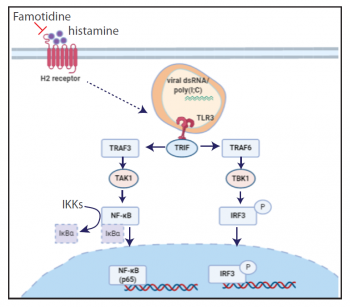12 Jul 2021 - Famotidine inhibits inflammatory signaling in SARS-CoV-2 infected cells
Until now, treatment options for COVID-19 patients are rather limited. A poor disease outcome is known to be linked to an uncontrolled inflammatory response, triggered by a cytokine storm and leading to wide-spread inflammation, severely damaging the lung and other organs. An interdisciplinary team around IBC2 Director Ivan Đikić now reports that inflammatory signaling activated by SARS-CoV-2 can be inhibited by a drug named famotidine. The drug acts as H2 receptor antagonist and is widely used for treatment of heartburn and prevention of stomach ulcers. Early on in the pandemic, retrospective studies have drawn the interest towards this drug, as it apparently reduced the risk of intubation and death for patients being hospitalized for COVID-19.
The Đikić group followed up on this observation to better understand the molecular mechanism behind this potential benefit. They showed that neither viral replication nor viral protease activity is influenced by famotidine. Instead, famotidine interferes with inflammatory signaling and reduces the levels of inflammatory mediators CCL-2 and IL6 that are triggering cytokine release. The team ascribes this effect to the regulation of TLR3 expression by histamine H2 receptors on immune cells. By counteracting the histamine-induced inflammatory response, famotidine and other antihistamines could potentially improve the outcome for patients suffering from severe COVID-19. Further clinical studies are now needed to follow up and translate these results from basic science into therapeutic rationales.
The study is accepted for publication by the Journal of Biological Chemistry. It demonstrates once more the importance of multidisciplinary collaboration in fighting the pandemic. On the side of Goethe University, besides IBC2, the Buchmann Institute for Molecular Life Sciences and the Institute of Medical Virology were part of this project, as well as colleagues from the Max Planck Institute of Biophysics in Frankfurt, the University Medical Center Mainz, the Leiden University Medical Center, the Yonsei University in Republic of Korea and the Chinese University of Hong Kong.
